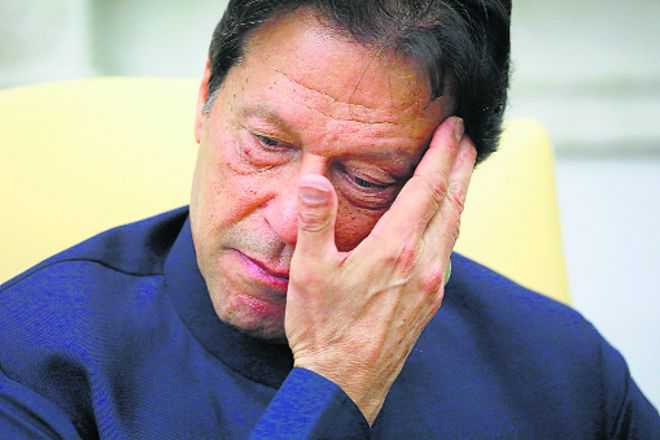
Tilak Devasher
Member, national security advisory board
When Imran Khan set foot on American soil, it was the 43rd time that a Pakistani leader was visiting the US since PM Liaquat Ali’s first visit in May 1950.
The summit between PM Imran and US President Trump generated a lot of interest since it took place against the backdrop of several years of a discordant relationship and their tense Twitter exchange last year. Even before he assumed office, and especially since then, President Trump had frequently singled out Islamabad for being a duplicitous partner in Afghanistan. In the past, Imran Khan, too, had been critical of his country’s partnership with the US, accusing previous Pakistani leaders of being too deferential to American dictates.
For Pakistan, the visit provided an opportunity to ‘reset’ the acrimonious relations with the US, building upon the significant change in Trump’s attitude towards Pakistan. For the US, the Afghan peace process leading to the withdrawal of US troops was the key issue on the agenda, with Trump viewing US exit as the key to his re-election in 2020.
By all accounts, Imran went with a long wish list. Substantive items were economy, the Afghan peace process and issues related to India, though not necessarily in that order. Underlying the wish list was Pakistan’s desire to look for a broader engagement with the US that was not confined to Afghanistan, but also encompassed economic and trade cooperation as well as peace and stability in South Asia.
Though the visit was meant to focus on Afghanistan, two issues diverted attention. The first was Imran’s confession that there were 40 terrorist groups in Pakistan and between 30,000-40,000 terrorists who had fought in Afghanistan and Kashmir. The full ramifications of this acknowledgement of Pakistan being a state sponsor of terror are still a work in progress and more will be heard about it in the days to come.
The second was Trump’s patently false assertion that he had been asked by PM Modi to mediate on Kashmir. Imran possibly couldn’t have believed his ears and egged Trump on by saying: ‘Mr President…you would have the prayers of over a billion people if you can mediate and resolve this issue.’
Within minutes of the claim being aired, India’s External Affairs Ministry refuted it, saying the PM had made no such request. The External Affairs Minister made a stronger statement in Parliament.
Hours after Trump’s remarks, US officials did damage control by clarifying that Washington still believed that Kashmir was a bilateral issue between India and Pakistan; the administration welcomed Pakistan and India sitting down and the US stood ready only to assist the two parties. This showed that the US State Department was caught unawares by Trump’s leap into the Kashmir issue.
A factsheet issued by the White House at the conclusion of the Trump-Khan talks, while avoiding all mention of Kashmir, stated, ‘Pakistan has taken some steps against terrorist groups operating within Pakistan. It is vital that Pakistan take action to shut down all groups once and for all,’ adding that ‘Pakistan has made efforts to facilitate the Afghanistan peace talks, and we are going to ask them to do more.’ It also cautioned, ‘The path to a strong and enduring partnership between Pakistan and the US lies in working together to find a peaceful resolution of the conflict in Afghanistan.’
While Trump said, ‘I think Pakistan is going to help us out to extricate ourselves,’ and Imran assured of full cooperation, could the US be overestimating Islamabad’s influence over the Taliban? For Pakistan, the danger is that Trump could quickly change his approach if it is unable or unwilling to meet the US expectations regarding the Afghan peace process.
What the US is seeking is for the Taliban to agree to a permanent ceasefire and an intra-Afghan dialogue. Can Pakistan deliver? Does it have this kind of influence? Or is the influence limited to getting the Taliban to talk, but not being able to influence Taliban demands? The jury is out on this, but if Trump is not satisfied, Pakistan could be back in the doghouse.
Trump’s frustration was also apparent in his shocking comment that ‘I could win that war in a week. I just don’t want to kill 10 million people’, adding that Afghanistan would be wiped off the face of the earth in 10 days.
The key takeaway of the visit from Pakistan’s perspective would be Trump’s offer to mediate on Kashmir. His offer was a clear departure from the long-held US position that Kashmir was a bilateral issue between the two nuclear neighbours.
Other than that, the US insistence that Pakistan ‘do more’ continued; no trade deal was announced or hinted at; no investment was promised; there was no announcement of the restoration of aid/loan; and Trump called Pakistan subversive in the press conference. For the visit to result in ‘deliverables’ a lot would depend on the follow-up when diplomats get down to the nuts and bolts.
Overall, therefore, the visit alone is unlikely to lead to a reset in relations with the US or a multi-faceted long-term engagement. If at all, the reset would be driven by purely tactical considerations of the role that Pakistan can play in helping the US exit Afghanistan. The dilemma for Pakistan would be that if it does not deliver an honourable exit, Trump is likely to come down hard. If, however, it delivers a face-saving exit, it would no longer need Pakistan’s cooperation. The months ahead would provide a clue on how Pakistan resolves this dilemma.
